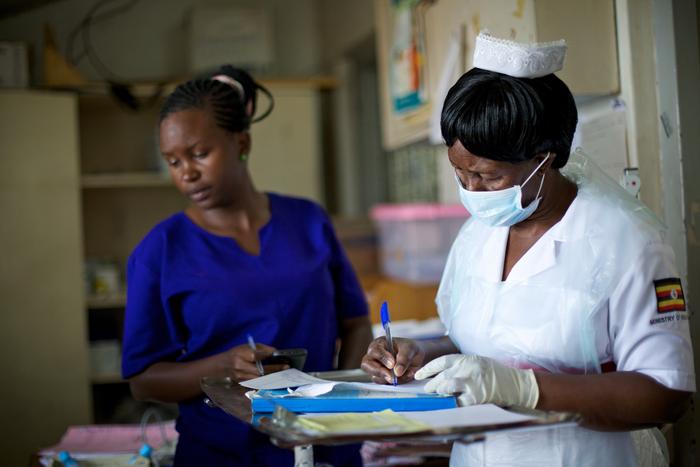NAIROBI, KENYA [May 1, 2024] — Local and global experts are meeting in Nairobi, Kenya to update clinical practice guidelines as part of ongoing work with Allied Against Cancer—a collaboration between the National Comprehensive Cancer Network® (NCCN®), African Cancer Coalition (ACC), American Cancer Society (ACS), and Clinton Health Access Initiative (CHAI). The meeting brings together subject matter experts to update NCCN Harmonized Guidelines™ for Sub-Saharan Africa, featuring updates for treating cancer in people with HIV and other important topics. The event runs from May 1-3, 2024.

Credit: NCCN
NAIROBI, KENYA [May 1, 2024] — Local and global experts are meeting in Nairobi, Kenya to update clinical practice guidelines as part of ongoing work with Allied Against Cancer—a collaboration between the National Comprehensive Cancer Network® (NCCN®), African Cancer Coalition (ACC), American Cancer Society (ACS), and Clinton Health Access Initiative (CHAI). The meeting brings together subject matter experts to update NCCN Harmonized Guidelines™ for Sub-Saharan Africa, featuring updates for treating cancer in people with HIV and other important topics. The event runs from May 1-3, 2024.
NCCN Harmonized Guidelines™ for Sub-Saharan Africa are available free-of-charge at NCCN.org/harmonized or via the Virtual Library of NCCN Guidelines® App.
“Published guidelines have a direct impact on improving cancer treatment for people living with HIV by alleviating fears of drug interactions and confirming the safety and necessity of commonly used therapies,” said Warren Phipps, MD, MPH; Medical Director, Uganda Cancer Institute – Fred Hutch Collaboration. “Many cancers occur more frequently in people with HIV and AIDS, including AIDS-defining cancers like non-Hodgkin lymphoma, Kaposi sarcoma, and invasive cervical cancer. Non-AIDS defining cancers are also on the rise in this population as AIDS treatment improves, leading to longer life expectancies. Sub-Saharan Africa is disproportionately burdened by HIV/AIDS, making these region-specific guidelines particularly necessary.”
The NCCN Harmonized Guidelines™ employ color-coded recommendations to delineate the best possible cancer care across various settings and resource availability. They are based on the NCCN Clinical Practice Guidelines in Oncology (NCCN Guidelines®)—evidence based expert consensus recommendations maintained by multidisciplinary panels of leading clinicians and researchers. Allied Against Cancer is committed to updating these tailored guidelines at least every other year, meeting with local oncologists in Sub-Saharan Africa to share expertise and experience.
“These meetings give us unique and productive opportunities for knowledge sharing across different countries and specialties,” said Shanthi Sivendran MD, MSCR, MBA, Senior Vice President for Cancer Care Support, American Cancer Society. “By standardizing treatment approaches based on the latest evidence, we can help make sure that patients are receiving optimal care. These guidelines also provide a blueprint for how best to scale up capacity in resource-constrained areas.”
The Nairobi meeting will focus on updates to the NCCN Harmonized Guidelines™ for People Living with HIV, as well as the following cancer types:
- Breast Cancer
- Kaposi Sarcoma
- Malignant Pleural Mesothelioma
- Non-Small Cell Lung Cancer
- Occult Primary (Cancer of Unknown Primary)
- Prostate Cancer
- Small Cell Lung Cancer
- Thymomas and Thymic Carcinomas
The group will also update NCCN Harmonized Guidelines™ focused on prevention and supportive care, including:
- Breast Cancer Screening and Diagnosis
- Prevention and Treatment of Cancer-Related Infections
- Prostate Cancer Early Detection
William J. Gradishar, MD, Robert H. Lurie Comprehensive Cancer Center of Northwestern University, Chair of the NCCN Guidelines Panel for Breast Cancer is participating in the meeting, along with Gregory J. Riely, MD, PhD, Memorial Sloan Kettering Cancer Center, Chair of the NCCN Guidelines Panel for Non-Small Cell Lung Cancer/Mesothelioma/Thymomas and Thymic Carcinomas Panel and Manoj P. Menon, MD, MPH, Fred Hutch Cancer Center, who is a Member of the NCCN Guidelines Panels for Cancer in People with HIV and Kaposi Sarcoma.
“The NCCN Harmonized Guidelines exemplify our commitment to advancing cancer care and reducing global disparities in cancer-related access and outcomes,” said Crystal S. Denlinger, MD, Chief Executive Officer, NCCN. “We hope their ongoing use and implementation leads to tangible, continuous improvements for cancer prevention and treatment across Sub-Saharan Africa and contributes to better health outcomes for individuals throughout the region.
NCCN Harmonized Guidelines™ for Sub-Saharan Africa have been endorsed by the Federal Ministries of Health and leading cancer centers in Ethiopia, Liberia, Malawi, Nigeria, Tanzania, Uganda, and Zambia, representing 44% of the population of Sub-Saharan Africa. Learn more about Allied Against Cancer’s efforts to improve cancer outcomes at alliedagainstcancer.org.
# # #
About the National Comprehensive Cancer Network
The National Comprehensive Cancer Network® (NCCN®) is a not-for-profit alliance of leading cancer centers devoted to patient care, research, and education. NCCN is dedicated to improving and facilitating quality, effective, equitable, and accessible cancer care so all patients can live better lives. The NCCN Clinical Practice Guidelines in Oncology (NCCN Guidelines®) provide transparent, evidence-based, expert consensus recommendations for cancer treatment, prevention, and supportive services; they are the recognized standard for clinical direction and policy in cancer management and the most thorough and frequently-updated clinical practice guidelines available in any area of medicine. The NCCN Guidelines for Patients® provide expert cancer treatment information to inform and empower patients and caregivers, through support from the NCCN Foundation®. NCCN also advances continuing education, global initiatives, policy, and research collaboration and publication in oncology. Visit NCCN.org for more information.
About the American Cancer Society
The American Cancer Society is a leading cancer-fighting organization with a vision to end cancer as we know it, for everyone. For more than 100 years, we have been improving the lives of people with cancer and their families as the only organization combating cancer through advocacy, research, and patient support. We are committed to ensuring everyone has an opportunity to prevent, detect, treat, and survive cancer. To learn more, visit cancer.org or call our 24/7 helpline at 1-800-227-2345. Connect with us on Facebook, Twitter, and Instagram.



